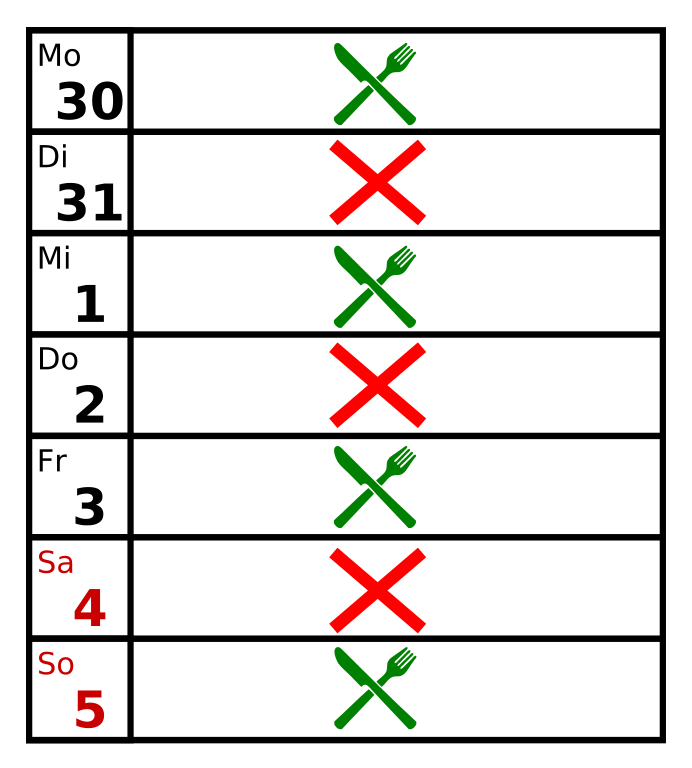I’ve discovered the beauty of intermittent fasting, and it was actually by accident. The story begins when I recently went on a mini vacation with my family to the beach. Whenever I go on vacation, whether it’s a mini vacation or an extended vacation, I tend to sway a bit from my usual nutrition plan. I still eat relatively healthy, but by no means do I adhere to the same regimented plan as I do when I’m home and in my normal routine. Interestingly enough, whenever I return from vacation, I notice I’ve either lost a few pounds, or I seem to be leaner and more cut up than usual, despite my nutrition plan being all off, and despite eating foods I normally wouldn’t eat like bags of cotton candy, creamy pastas, sugar infused beverages, etc. This happened to me on several occasions, all of which have the same underlying theme, and that is, my nutrition and eating plan was completed messed up for a period of days.
I thought about this a bit more when I returned from my recent mini vacation, and what I concluded is, I was unknowingly engaging in mini fasting, or better known as intermittent fasting. What the heck is intermittent fasting? Well, in a nutshell, this means fasting for short bursts of time each day or fasting for a day, a couple times a week. I’ve heard of intermittent fasting before, but I never really looked into it all that much but after I read up a little bit on it, it made perfect sense to me, and also gave a perfect explanation why I always feel leaner and more cut after brief moments of swaying from nutritional routine. If you want to boost your metabolism and turn your body into a fat burning machine, intermittent fasting can certainly play a role in doing so. So let’s break down this method of eating so see how and why it’s effective.
“If you want to boost your metabolism and turn your body into a fat burning machine, intermittent fasting can certainly play a role in doing so.”
Intermittent Fasting is an eating pattern in which you cycle between periods of fasting and eating. I say eating pattern because, unlike a diet plan, it doesn’t specify which foods you should eat but rather when you should eat them. Simply put, it’s purposely (or in my case on accident) skipping certain meals each day and going for longer than normal periods of time without eating, and subsequently taking in fewer calories on a daily basis overall.
There’s a few different methods people use when doing intermittent fasting. The three main ways are:
- The 16/8 method: Also called the Leangains protocol, it involves skipping breakfast and restricting your daily eating period to 8 hours, such as 1–9 p.m. Then you fast for 16 hours in between. Hence the name 16/8. Fast for 16 hours, eat during the other 8 during a 24 hour period.
- Eat-Stop-Eat: This involves fasting for 24 hours, once or twice a week, for example by not eating from dinner one day until dinner the next day. Not exactly my cup of tea, but to each his or her own.
- The 5:2 diet: With this methods, you consume only 500–600 calories on two non-consecutive days of the week, but eat normally the other 5 days.
I think in my particular situation, I was doing more of a hybrid version of these, as I wasn’t doing any of them intentionally so I suppose I sort of did a 16/8 method of sorts mixed with a 5:2 diet of sorts. I definitely went longer than usual periods of time without eating, and ate much less than usual on a couple days, but caught up the following day and so on.
How does Intermittent Fasting Work ?
Now obviously by skipping a meal every day, or eating only 500-600 calories a day, you’re taking in less calories and therefore it would make sense that you’re gonna lose weight. However, there’s a bit more to it, specifically to what you’re body is doing when fasting or when eating in an intermittent fasting pattern.
When you eat food, or more specifically an actual meal, your body then starts to process the food, which takes a few hours. Your body begins burning what it can from what you just consumed to use as energy. Because it has readily-available, easy to burn energy (food is just that, energy for your body), your body will naturally use the food as energy rather than use stored fat as energy. This is even more so if the food you just consumed is full of sugary carbohydrates, as your body will burn sugar as energy before any other source.
During the “fasted state” (the hours in which your body is not consuming or processing any food) your body doesn’t have any recently consumed food to use as energy, so it’ll therefore pull from the stored fat your already have stashed in your body because it’s the only energy source readily available for it to use!
The same logic goes for working out in a “fasted” state, which is a preferred method for many trying to lose weight. I’m sure you’ve heard of the method of working our first thing in the morning to burn more fat. We’ll, that’s based on the fasting logic too. If your body doesn’t have a ready supply of glucose and glycogen (a starch stored as energy) to use, which it won’t in a fasted state, your body is going to pull from the fat stored in your body because it’s the only source of energy it can find.
Our bodies react to eating food by producing insulin. The more sensitive a person’s body is to insulin, the more they’ll use the food efficiently, and your body is most sensitive to insulin following a period of fasting (1)Garaulet, M., Gomez-Abellan, P., Alburquerque-Bejar, J.J., Lee, Y.C., Ordovas, J.M., Scheer, F.A.
These changes to insulin production and sensitivity have been proven to help lead to weight loss (2)Grant M. Tinsley, Paul M. La Bounty; Effects of intermittent fasting on body composition and clinical health markers in humans, Nutrition Reviews, Volume 73, Issue 10, 1 October 2015, Pages 661–674, and muscle creation (3)Regulation of protein synthesis by insulin:. Your glycogen is depleted during sleep as well (which is a fasting period), and gets used even more during training which will in turn lead to increased insulin sensitivity.
This is why eating after your workout allows the nutrients to be stored and used most efficiently.
Right after a workout, the food you consume will be either be converted to glycogen and stored up in your muscles or burned as energy immediately to help with the recovery process, with very little being stored as fat.
When you’re eating normally and not doing intermittent fasting, insulin sensitivity is at normal levels, and therefore the carbohydrates and foods consumed will be more likely to get stored as fat because your body has a full glycogen storage and also has enough glucose in the bloodstream.
Furthermore, growth hormone is increased during fasted states (both during sleep (4)Takahashi, Y., Kipnis, D. M., & Daughaday, W. H. (1968). Growth hormone secretion during sleep. Journal of Clinical Investigation, 47(9), 2079–2090. and after a period of fasting). Combined with the growth hormone secretion from exercise (5)The exercise-induced growth hormone response in athletes: Godfrey RJ, Madgwick Z, Whyte GP. Sports Med. 2003;33(8):599-613., the decrease in insulin production from fasting (which creates an increase in insulin sensitivity(6)Effect of intermittent fasting and refeeding on insulin action in healthy men. Nils Halberg, Morten Henriksen, Nathalie Söderhamn, Bente Stallknecht, Thorkil Ploug, Peter Schjerling, and Flemming Dela; Journal of Applied Physiology 2005 99:6, 2128-2136 and you’re basically preparing your body for muscle growth and fat loss with intermittent fasting.
In summary, intermittent fasting can help your body use the food it consumes more efficiently, and your body can learn to burn fat as fuel when you deprive it of new calories to constantly pull from (which is what happens when you eat throughout the day)
So if you’re looking to embark on a new method to lose weight, or want to get a bit more shredded for the beach, give intermittent fasting a shot and see how it works. The science behind it is strong and solid, and the results I’ve seen myself are encouraging. Personally, I’m not sure I would want to do intermittent fasting all that often, but as an option here and there for getting shredded, it’s one of the better methods to do so.
References


